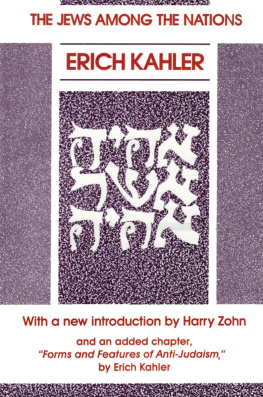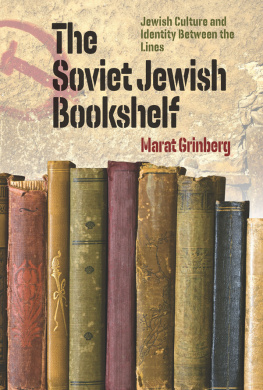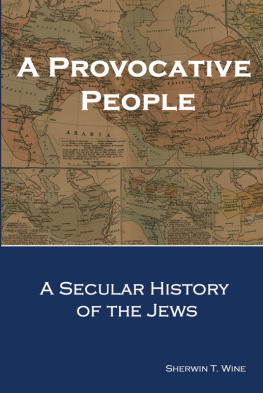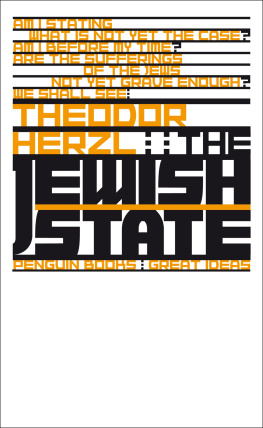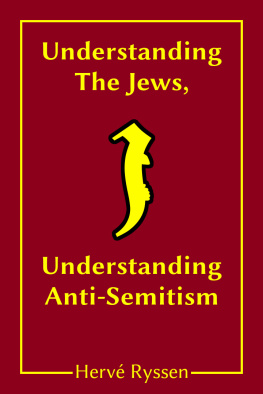Originally published in 1967
by Frederick Ungar Publishing Co.
Published 1989 by Transaction Publishers
Published 2018 by Routledge
2 Park Square, Milton Park, Abingdon, Oxon OX14 4RN
52 Vanderbilt Avenue, New York, NY 10017
Routledge is an imprint of the Taylor & Francis Group, an informa
New material this edition copyright 1989 by Taylor & Francis.
All rights reserved. No part of this book may be reprinted or reproduced or utilised in any form or by any electronic, mechanical, or other means, now known or hereafter invented, including photocopying and recording, or in any information storage or retrieval system, without permission in writing from the publishers.
Notice:
Product or corporate names may be trademarks or registered trademarks, and are used only for identification and explanation without intent to infringe.
Library of Congress Catalog Number: 88-21638
Library of Congress Cataloging-in-Publication Data
Kahler, Erich, 1885-1970.
The Jews among the nations / Erich Kahler: with a new introduction by Harry Zohn.
p. cm.
Reprint. Originally published: New York: F. Ungar Pub., C1967.
The Jews and the Arabs in Palestine, by Albert Einstein, Erich Kahler, and Philip K. Hitti: p.
ISBN 0-88738-247-9
1. Jews--History--Philosophy. 2. Jews-Identity. 3. Jews-Germany. 4. Germany--Ethnic relations. 5. Jewish-Arab relations--1917-1949. I. Title.
DS115.5.K35 1988
909.04924--dc19
88-21638
ISBN 13: 978-0-88738-247-5 (hbk)
The German word Universalgelehrter comes to mind when one thinks of Erich Gabriel von Kahler (1885-1970). Polymath, its English equivalent, is far less self-defining and expressive than the German term, which evokes the Italian concept of uomo universale as applied to such exceedingly rare human phenomena as Leonardo da Vinci.
Erich von Kahler was a native of Prague and one of those German-speaking Jewish writers and thinkers from Czechoslovakia who have made imperishable contributions to German literature and culture. The ancient Jewish community of Prague, the Mother in Israel, had a long tradition of learning. In a study of Franz Kafka, the most renowned of the German-Jewish writers from Prague, Pawel Eisner emphasizes the strong currents of religion, mysticism, and folklore that flowed through the city of the alchemists and of the Golem. Its Jewish writers and scholars were Bildungsdeutsche, Germans by education and intellectual orientation only. Johannes Urzidil, a member of the circle around Kafka and a friend of Kahler, has pointed out that the German-speaking writers of this alchemistic melting pot had access to four ethnic sources: the German, the Austrian, the Czech, and the Jewish. These elements often flowed together in a mighty stream and gave these writers and thinkers a breadth, a cosmopolitan outlook, and a polemical impetus rarely vouchsafed their Czech colleagues. Yet many of them were eager to join the intellectual mainstream and move to other cities of the German-speaking world. Of the Prague-born writers who ultimately escaped from what many regarded as a confining atmosphere and a spiritual ghetto-it has been remarked that the much-maligned Prague German lacked the vitalizing influence of a local dialect-Franz Kafka, Rainer Maria Rilke, Franz Werfel, and Max Brod achieved international renown.
Among the numerous distinguished Jewish thinkers and scholars who emanated from Czechoslovakia-suffice it to mention Hugo Bergmann, Hans Kohn, Felix and Robert Weltsch, Guido Kisch, Franz Kobler, and Erich Heller-Erich von Kahler occupies a very special place. After studying and working in Vienna, Berlin, and Heidelberg, Kahler emigrated to Zurich in 1933 and to the United States in 1938. Prior to this he had been living in Wolfratshausen near Munich from 1912 till 1933 as a private scholar. After showing his manuscript of Der deutsche Charakter in der Geschichte Europas to a publisher in 1931 he was denounced by a Nazi and his name was on the list for burning books when Hitler came to power. He lost his house, his fortune and his citizenship which he had only acquired in 1929. He was not in Germany at that time, which saved his life since the Gestapo was in his house ten days after election day to search for the manuscript. It was hidden in a safe and was later smuggled out to Switzerland where the book was published in 1937 by Europa Verlag. He subsequently taught at the New School for Social Research, Black Mountain College, Cornell University, the Princeton Institute for Advanced Studies, Ohio State University, the Center for the Study of Democratic Institutions at Santa Barbara, and Princeton University. The very versatility and breadth of this philosopher of history, literary critic, Germanist, political scientist, and cultural historian make him difficult to classify. When Princeton University bestowed upon Kahler the honorary degree Doctor of Letters in 1969, the accompanying citation read:
Historian and philosopher, above all humanist, he is one of the leaders of that brilliant procession of European thinkers who came to and enriched the intellectual life of this country at the time of the Second World War. The devotion he inspires springs from a compassion as profound as the learning that has made One Evelyn Place, Princeton, a landmark of the mind Thomas Mann called his heart one of the warmest and wisest, his mind one of the richest of modern times.
Kahlers magnum opus, Man the Measure (1943), is subtitled A New Approach to History, and his friend (and sometime Princeton guest) Hermann Broch has called Kahlers treatment of history as the moral anthropology of the world his scienza nuova: History is not regarded as a museum of past ages or an accumulation of acts relating to individual enterprises; instead, the historian makes a progressive, dynamic attempt to understand and present the events of a period synoptically, from more than one point of view.
Some of Erich von Kahlers most thoughtful and most heartfelt essays were the fruit of decades of concern with what has been called the Jewish question. Thus it is highly fitting that Transaction Books should issue a new, expanded edition of Kahlers collection The Jews Among the Nations, first published in 1967 (and not identical with Israel unter den Vlkern, 1933, 1936), for these essays, in which Kahler wears his great learning lightly and writes lucidly, are of undiminished timeliness Kahler regards the Jewish problem as insoluble, for he views the Judenfrage as a reflection or symbol of the Menschenfrage, the question of humanity or human problem, just as Jewish history should be viewed as a special version of world history. Kahler was not a Zionist, yet he warmly supported both the idea and the reality of a Jewish state as an autonomous, protected home for the decimated, deracinated Jewish people, though with important reservations. He had an idealistic conception of the ethical and moral power of Judaism, believing that the Jews should not put the historical clock back on themselves and reduce their age-old worldwide mission to the confines of a small country. In his view, the concept of a latter-day (or belated) statehood was not the be-all and end-all of Judaism; statehood could not make the State of Israel an end in itself, and, above all, nationalistic fervor must never stifle the Jews glorious tradition and their universally human mission.

